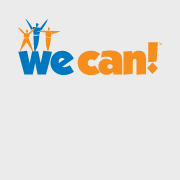We Can!® Community Sites in Action

We Can! Across the Country
A total of 1,344 Community Sites have signed up for We Can! in 50 states, the District of Columbia, Puerto Rico, the Northern Mariana Islands, and 12 other countries: Antigua and Barbuda, Australia, Bangladesh, Canada, Fiji, Greece, India, Israel, Nigeria, the Philippines, Spain, and Uganda (140 Intensive Sites, 1,181 General Sites, and 23 We Can! Cities/Counties).
See a map of We Can! community sites by state and find a site near you to participate in their We Can! programs.
We Can! Celebrates Five Years in Action
In just five years, We Can! has grown from 14 pilot intensive sites to more than 1,300 registered community sites in all 50 states, the District of Columbia, and 12 other countries.
To mark this milestone, We Can! is launching the following series of activities:
1. Our first video contest: We invited our current community sites to create and submit a video highlighting one or more of We Can!'s three key behaviors. Check out the videos and vote at: http://wecan.nhlbi.nih.gov/videocontest/index.htm.
2. "Who can make maintaining a healthy weight fun? We Can!" displays in buses and rail cars/stations in 13 U.S. cities.
3. A promotional video that will illustrate why our program is a great fit for a variety of communities and organizations. When it becomes available, you will be able to watch it on our We Can! YouTube page (http://www.youtube.com/nihwecan ), and see what some of our community sites and partners have to say about the program.
), and see what some of our community sites and partners have to say about the program.
To our community sites, partners, and supporters, thank you for your support of
We Can! and your commitment to helping children, families, and communities maintain a healthy weight.
To learn more about the We Can! Five Years of Progress activities, check out http://wecan.nhlbi.nih.gov/news-events/news56.htm.
A West Virginia We Can! Site Reaches Latino Residents with "Familias Saludables"
If you watched famed English chef Jamie Oliver's recent TV special about nutrition in West Virginia, you know that some families struggle to eat nutritious meals. And while Jamie Oliver is focusing on families in Huntington, WV, Robin Truax is helping to bring nutrition messages to families in another WV city.
Truax, the director of West Virginia Kids in Action�a nutrition and physical activity program in Martinsburg, funded by the Berkeley County Schools and Shenandoah Community Health Center�has been running We Can! programs since 2007 when she attended a We Can! training.
"The We Can! Harrisburg, PA, training gave me the materials and taught me simple and interactive ways to teach good nutrition," said Truax. "Hearing how other people were adapting the program to meet their needs also helped convince me that I could run the program even though I'm the only paid employee in my organization."
She was particularly inspired by how a group of Texans had adapted the program for the Lone Star State's many Latinos. With a growing Latino community in her area, Truax not only decided to run the four�week We Can! parent program in Spanish as well as English; she and her team also adjusted the course to meet the community's specific needs.
"We provide free childcare to parents since our Latino community likes to do things as a family," said Truax. "It brings in more fathers. Plus, we drive the message home by mirroring the hands�on activities in the parent training with similar activities for the kids in childcare."
At the end of each class, children and parents come together to make and enjoy a healthy snack. They also get special gift bags�containing kitchen items, calendars, healthy recipe books, a grocery store gift card, a CD of dances for the family, and other information�during the first and last session to help put and keep them on the right track to maintaining a healthy weight.
Truax also introduces training participants from both the Spanish and English groups to one another through events such as a recent potluck where everyone brought a healthy dish and then did some hula hooping. "You become a support group... a family," said Truax.
Mixing and Matching Programs to Reach Arizona's Food Stamp�Eligible Communities<
What's the key to reaching low�income communities with messages about how to stay at a healthy weight? The secret recipe�according to a We Can! site in Nogales, Arizona�is using We Can! messages and materials to bolster existing nutrition and physical activity programming, and reach more participants.
"We were looking for a government�approved program with both good nutrition and physical activity components, so I asked a friend who's with the University of Arizona�Nutritional Sciences Department for her suggestion of a good program," says Chris Bachelier, a new We Can! community site leader. "She recommended
We Can! right off of the top of her head!"
Bachelier directs the Arizona Nutrition Network (funded through the USDA) Mix it Up: Food, Fitness and Fun Program, which caters to food�stamp eligible recipients, and began incorporating We Can!'s nutrition materials into new nutrition classes at the Anza Gym at the Nogales Housing Authority in January 2010. "Mix It Up" launched in September 2007 as a partnership between the Santa Cruz County Superintendent of Schools, the University of Arizona Cooperative Extension, and Mariposa Community Health Center.
We Can! Community Site Breakdown
Demonstrating program flexibility, adaptability and value, We Can! sites represent a diversity of implementation settings, from schools and park and recreation departments to hospitals, health systems and public health departments
(12 different settings in total).
- Hospitals, Health Systems, and Health Providers: 24%
- Community�Based Organizations: 20%
- Schools and School Systems: 15%
- Obesity and Health Coalitions: 7%
- Health Deptartments: 6%
- Fitness and Wellness Centers: 6%
- Faith-Based Organizations: 4%
- Parks and Recreation Departments: 4%
- Private Companies: 3%
- Extensions: 2%
- Universities: 2%
- Other: 7%









